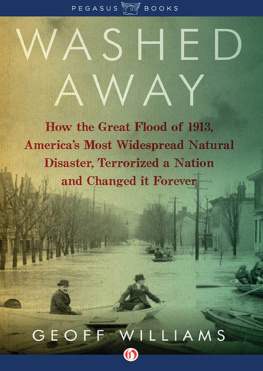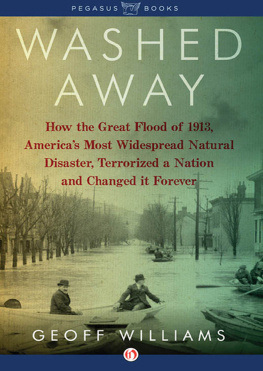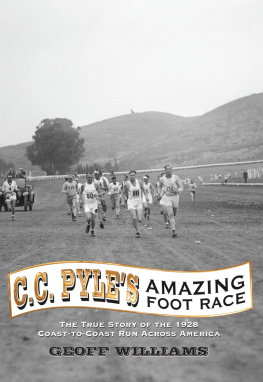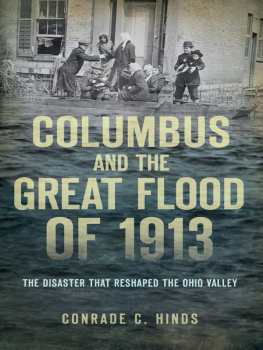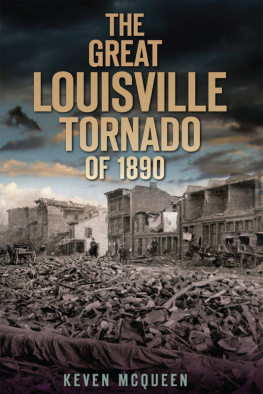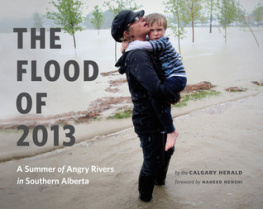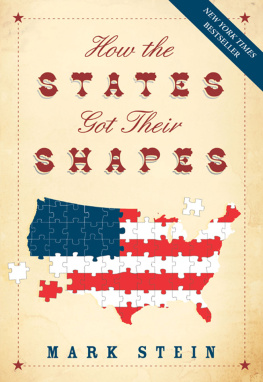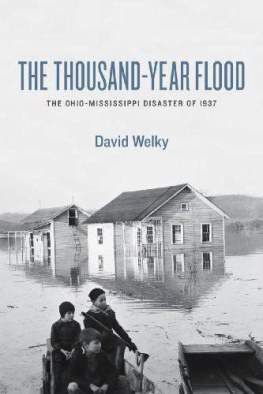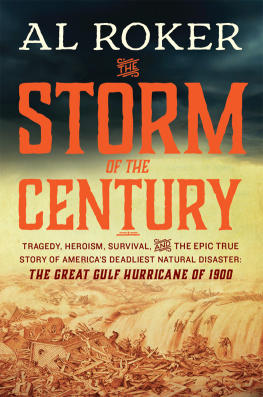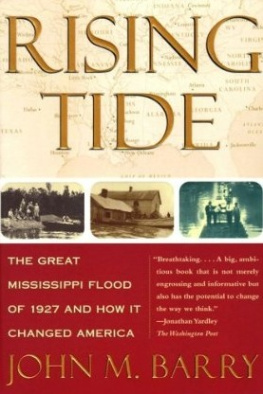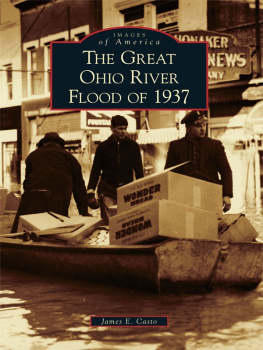WASHED AWAY
How the Great Flood of l913,
Americas Most Widespread Natural
Disaster, Terrorized a Nation
and Changed It Forever
GEOFF WILLIAMS

PEGASUS BOOKS
NEW YORK LONDON
Authors Note
On March 23, 1913, the United States of America was reminded that when it comes to nature, were not really in charge. It was an Easter Sunday, but the thunderstorm that almost crushed the Midwest into oblivion could have been straight out of the Biblical story of Noahs Arkonly it didnt rain for forty days, but, depending where you lived, more like four or five. The rain, in any case, was long enough to create the most widespread natural disaster in the history of the United States. Millions upon millions of 1913 dollars of damage. Hundreds of thousands of families and individuals were driven from their homes. There were at least several hundred, and probably more like a thousand, deaths. It was a flood of such epic proportions that it forever changed how the United States manages its waterways.
My first memory of hearing about the flood is about as innocuous and ordinary a memory as you can get, so boring that Im almost embarrassed to bring it up. I was standing with an uncle of mine, Pat Scorti, in Middletown, Ohio, at a gas station. I think I was eight years old, which would place us in 1978. He was pumping unleaded into a beat-up car that he had probably purchased a decade earlier. What exactly he was talking about as he pumped, I have no idea, but suddenly his monologue landed on the 1913 flood. He mentioned how there was water for miles, and that Dayton, a city just north of us, really was hammered by it, and that about a dozen people died in Middletown alone. It was very serious, he said, his voice full of awe, as if he had been there, but he hadnt. He was born over thirty years after the flood.
Thats about all I remember. It was a brief, inconsequential moment in time, which somehow stuck with me, but I think the conversation explains a lot about why this flood has now been forgotten. This was a disaster that felt local and wasnt necessarily viewed by individual communities as a national calamity. But during and after the time the water receded, the Great Flood of 1913Arthur Ernest Morgan once called it that; he was a famed engineer whose flood control techniques became widely known and disseminated after the disasterwas often compared to the 1906 San Francisco earthquake and fire and the sinking of the Titanic just a year before. And for good reason. The Great Flood of 1913 affected far more Americans than both of those previous disasters combined.
Yet the sinking of the Titanic and the San Francisco earthquake were disasters that were contained and created an easy-to-grasp story. The rest of the country could read about the thrilling adventures (the papers back then described every near-death escape as thrilling) and wonder what they would have done if they had been there; and of course, movies, like San Francisco in 1936 with Clark Gable walking around in a daze, and the Titanic films, not to mention shelves of books, all helped to fuel our collective imaginations of the heroes, villains, and victims within each story. Conversely, the Great Flood of 1913 affected so many people that, arguably, people didnt want to wonder what they would have done if they had been there. They were there. Or they had friends and family who were there. After a while, nobody wanted to talk about it. It was too close for too many. If anything, people wanted to forget about this disaster.
The flood disaster also, as noted, became very localized. Waterlogged cities adopted the flood as part of their local history, and so instead of becoming known as the Great Flood of 1913, folks around Dayton, Ohio, would talk of the Great Dayton Flood. Residents in Columbus, Ohio, would speak of the Great Columbus Flood. People in Indianapolis thought of it as an Indianapolis flood. My uncle seemed to think of it as a flood that affected only Middletown and Dayton. While it was a national tragedy, or at least a semi-national apocalyptic catastrophe, hitting over a dozen states and terrifying friends and family across the nation, the flood tended to be thought of as a neighborhood event instead of as part of a national narrative.
It may also have been forgotten because the exact death toll of the flood isnt known and may never be known, so its easy to forget how deadly and damaging it was. Historian Trudy E. Bell, who wrote The Great Dayton Flood of 1913 (Arcadia Publishing) and has written extensively on the topic, has placed the death toll at over 1,000, which sounds right to this author, but the numbers bandied about throughout the 20th century often focused on only the deaths in Ohio and Indiana, when a considerable number of people in other states lost their lives.
Four hundred and sixty-seven deaths is the most quoted number for Ohio, devised by J. Warren Smith, who in 1913 was a professor of agricultural meteorology at the U.S. Department of Agriculture, and the number of deaths for Indiana quoted is usually 200. A June 5, 1921 New York Times article placed the figure of the deaths in Ohio and Indiana as 730, which may or may not have included victims from other states like Illinois, Kentucky, Missouri, West Virginia, Pennsylvania, and the hundreds of others who died in the tornadoes that came with the storm that initially brought the flood. In other words, this wasnt a tidy disaster like the RMS Titanic had been with her loss of over 1,500 souls.
The flood has also been somewhat forgotten because there have always been floods, and there always will be. Its hard for the history books to remember the flood of 1913 when its also competing with the Mississippi Flood of 1912, the Great Mississippi Flood of 1927, the Great Flood of 1937, andwell, you get the idea.
After my uncle brought up the flood, I didnt think about it for most of my life. Sure, I would occasionally hear about it in the local news when a flood anniversary came up and think, Wow, sounds pretty bad, but it never captured my imagination; although in recent years, I started to develop a healthy fear and respect for rivers. My young daughters enjoy wading in a creek that feeds into the Little Miami River, searching for tadpoles, minnows, and the occasional toad or turtle. Its a few feet deep at the most and home to a lot of tadpoles, guppies, and the occasional turtle and water snake, but in 1913, this meandering waterway was around 50 feet deep for several days. But looking at the docile, picturesque creek now, youd never believe it. In fact, the creek and the Little Miami River swamped downtown Loveland, Ohio (population in 1913: 1,476), a community I live near and visit often, putting its downtown five to ten feet under water and submerging twenty-five percent of the homes in the area. But what really got me was a death near Loveland, a little over ten years ago. A sixteen-year-old girl was in a SUV with three teenage friends, and the vehicle suddenly found itself floating on a road after a flash flood. Three of the teenagers were able to get themselves to safety, simply by choosing to climb out of the left side of the car; the sixteen-year-old escaped out of the right passenger window and made her way toward a retaining wall that she didnt see, and she fell over it and into Sycamore Creek. A day or two later, her body was found floating in a lake that my kids and I occasionally visit. It horrified me as a human being and parent, in part because I travel on this road frequently; and I think, for the first time, I started to understand the terrifying, ugly power of a flood.

